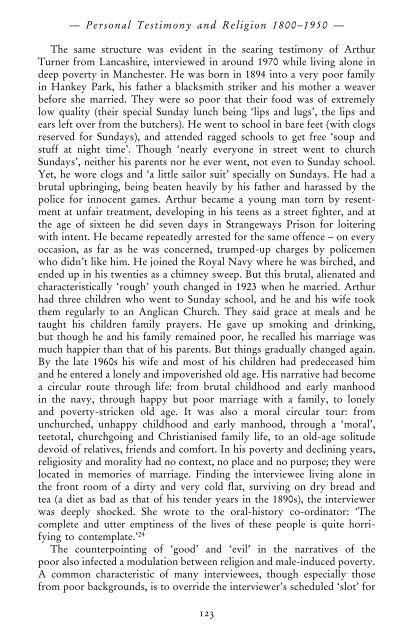The Death of Christian Britain
The Death of Christian Britain
The Death of Christian Britain
Create successful ePaper yourself
Turn your PDF publications into a flip-book with our unique Google optimized e-Paper software.
— Personal Testimony and Religion 1800–1950 —<br />
<strong>The</strong> same structure was evident in the searing testimony <strong>of</strong> Arthur<br />
Turner from Lancashire, interviewed in around 1970 while living alone in<br />
deep poverty in Manchester. He was born in 1894 into a very poor family<br />
in Hankey Park, his father a blacksmith striker and his mother a weaver<br />
before she married. <strong>The</strong>y were so poor that their food was <strong>of</strong> extremely<br />
low quality (their special Sunday lunch being ‘lips and lugs’, the lips and<br />
ears left over from the butchers). He went to school in bare feet (with clogs<br />
reserved for Sundays), and attended ragged schools to get free ‘soup and<br />
stuff at night time’. Though ‘nearly everyone in street went to church<br />
Sundays’, neither his parents nor he ever went, not even to Sunday school.<br />
Yet, he wore clogs and ‘a little sailor suit’ specially on Sundays. He had a<br />
brutal upbringing, being beaten heavily by his father and harassed by the<br />
police for innocent games. Arthur became a young man torn by resentment<br />
at unfair treatment, developing in his teens as a street fighter, and at<br />
the age <strong>of</strong> sixteen he did seven days in Strangeways Prison for loitering<br />
with intent. He became repeatedly arrested for the same <strong>of</strong>fence – on every<br />
occasion, as far as he was concerned, trumped-up charges by policemen<br />
who didn’t like him. He joined the Royal Navy where he was birched, and<br />
ended up in his twenties as a chimney sweep. But this brutal, alienated and<br />
characteristically ‘rough’ youth changed in 1923 when he married. Arthur<br />
had three children who went to Sunday school, and he and his wife took<br />
them regularly to an Anglican Church. <strong>The</strong>y said grace at meals and he<br />
taught his children family prayers. He gave up smoking and drinking,<br />
but though he and his family remained poor, he recalled his marriage was<br />
much happier than that <strong>of</strong> his parents. But things gradually changed again.<br />
By the late 1960s his wife and most <strong>of</strong> his children had predeceased him<br />
and he entered a lonely and impoverished old age. His narrative had become<br />
a circular route through life: from brutal childhood and early manhood<br />
in the navy, through happy but poor marriage with a family, to lonely<br />
and poverty-stricken old age. It was also a moral circular tour: from<br />
unchurched, unhappy childhood and early manhood, through a ‘moral’,<br />
teetotal, churchgoing and <strong>Christian</strong>ised family life, to an old-age solitude<br />
devoid <strong>of</strong> relatives, friends and comfort. In his poverty and declining years,<br />
religiosity and morality had no context, no place and no purpose; they were<br />
located in memories <strong>of</strong> marriage. Finding the interviewee living alone in<br />
the front room <strong>of</strong> a dirty and very cold flat, surviving on dry bread and<br />
tea (a diet as bad as that <strong>of</strong> his tender years in the 1890s), the interviewer<br />
was deeply shocked. She wrote to the oral-history co-ordinator: ‘<strong>The</strong><br />
complete and utter emptiness <strong>of</strong> the lives <strong>of</strong> these people is quite horrifying<br />
to contemplate.’ 24<br />
<strong>The</strong> counterpointing <strong>of</strong> ‘good’ and ‘evil’ in the narratives <strong>of</strong> the<br />
poor also infected a modulation between religion and male-induced poverty.<br />
A common characteristic <strong>of</strong> many interviewees, though especially those<br />
from poor backgrounds, is to override the interviewer’s scheduled ‘slot’ for<br />
123








